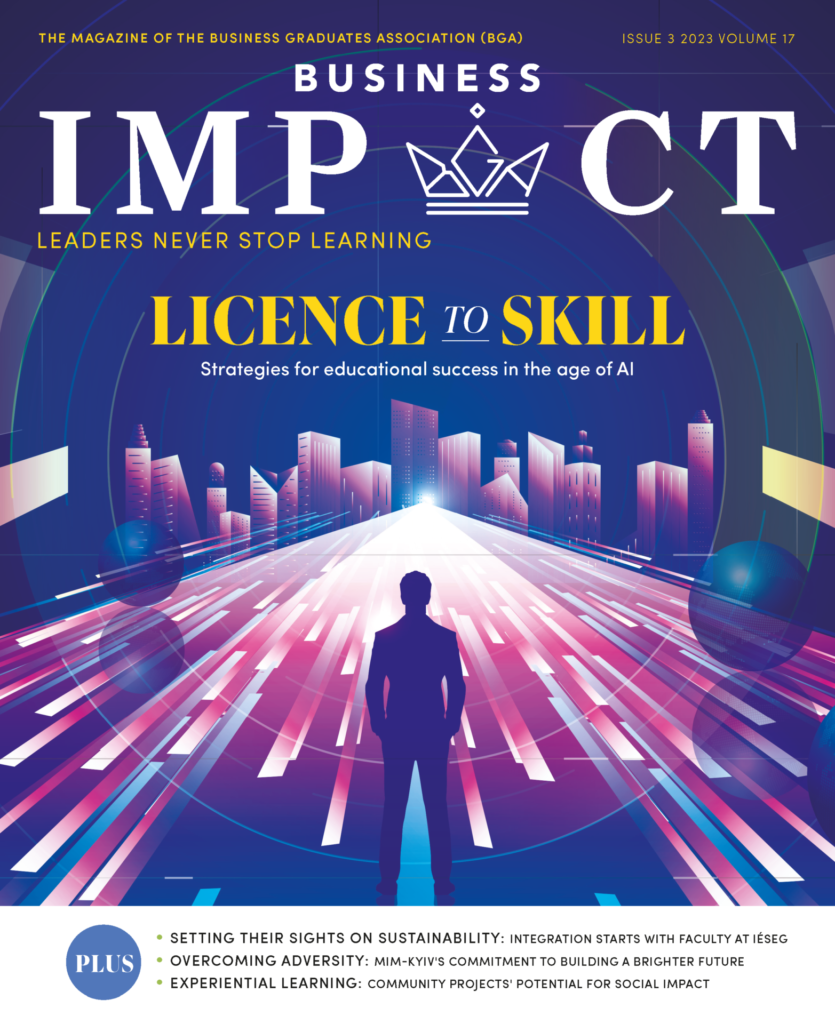AI: educational strategies for success


ChatGPT and AI and their potential to change the world of work is dominating the news agenda. For many in higher education the focus has been on how to detect when students are using this new technology to ‘enhance’ their exam results, or even cheat. In a world where machines can find most answers, those answers will only be as good as the humans inputting information – so it is imperative that future employees are well trained in asking questions and evaluating the responses.
The average time a skill stays relevant used to be more than 10 years. In 2017, this had reduced to five and it declined to four by 2022. Soon skills will be relevant for less time than it takes to complete a degree. The combination of accelerated change and advancements in AI means that the skills required in the future will differ considerably. For example, organisations may assess candidates solely on their ability to perform in a role, rather than their credentials and prior experience.
AI cannot carry out high-level tasks but it can perform as a collaborator, something that can be leveraged to delegate lower-level tasks and free up time for humans to concentrate on developing those skills they need to thrive. It is up to educators to show students the way by incorporating AI into the natural flow of work.
Here are five ways in which educators can support students in leveraging this technology.
Emphasise the importance of AI adaptability in classrooms
It is up to educators to emphasise that young people will not only have to live with AI, but also create an ecosystem using it to build vital skills. A growth mindset willing to take risks, fail and think of innovative solutions and ideas is a significant skill future leaders will need to embody. While technical skills are important, the significance of soft skills such as leadership, social influence, empathy and active listening cannot be neglected. As stated by the World Economic Forum, these skills rank among the top 10 in the category of self-efficacy and collaboration.
Developing skills in AI is not just about technological aspects. It is also concerned with examining the output generated by AI tools and building a mindset to leverage this. Conceptual understanding of AI will empower students to not only use it productively, but also evaluate and critique output professionally. Engaging students in discussions regarding the societal impact of AI, encompassing issues such as biases, privacy and ethics, facilitates the development of their ability to voice their opinions and provide constructive feedback.
Students can hone their ability to evaluate and develop professional scepticism skills by broadening their knowledge beyond the learning of technical abilities, such as understanding algorithms and programming languages. They can then hopefully contribute to the field of AI with wisdom and be leaders who necessitate a holistic approach that considers the broader implications and consequences of using AI tools. This allows them to recognise the limitations and potential biases inherent in AI algorithms, enabling them to contribute to the refinement of AI systems.
Integrating AI into classrooms can involve project‑based learning that revolves around students exploring real-world challenges, using AI to decipher problems and developing innovative solutions exploring the output generated by AI. Interdisciplinary team projects can promote skills such as critical thinking, problem-solving, data analysis and teamwork. These projects expose students to AI’s transformative potential and prepare them for AI-driven careers.
Give students hands-on experience to develop skills
By understanding the potential of AI and its impact on various industries, institutions can ensure that students are equipped to navigate an AI-driven world. This includes staying updated on AI applications in specialisations chosen by the student body.
According to the World Economic Forum, nearly one in four jobs are set to change over the next five years. The factors driving this trend include AI, digitisation, the green energy transition and supply chain reshoring. As the job market is set for a new era of turbulence, resulting in a decline in clerical work, employment growth will shift to areas such as analytics, management technology and cybersecurity, while the fastest-growing job roles will be driven by technology, digitisation and sustainability. On one hand, the fastest-declining roles are clerical but, on the other, analytical and creative thinking will remain the most important skills for workers until at least 2025.
Students must also consider this changing landscape and develop their digital cognitive thinking ability. Intelligent tutoring systems, such as ALEKS (for mathematics) can particularly benefit students, as the system uses knowledge tracing and machine learning to adjust the level of difficulty and provide guidance according to the student’s strengths and weaknesses.
Building impactful and influential global citizens is the major task of the ‘New Age’ educational institutions. Novel opportunities are being curated for people who are capable of explaining how the engineering and design of new technologies affect the political, economic, social and cultural sectors. Sharing insights about recent developments in the industry and implementing measures to cope with the dynamism of these mini-industrial revolutions can help students adapt within this turbulence.
Collaborate with industry for experiential learning
ELP, or experiential learning programmes, can enable students to apply theoretical knowledge of technology and AI to practical business scenarios. Within ELP, students gain the opportunity to collaborate closely with real companies, prepare consulting proposals, research, report and make recommendations to the client. The process is guided by industry experts and faculty advisors and the end result is an innovative culture that yields unparalleled insights into the global economy, assessed by first-hand experience.
Crucially, this hands-on approach encourages students to develop critical-thinking, problem‑solving and team-building skills while they work on real‑world business challenges. Tools such as Forage and InsideSherpa can assist students by generating fast‑paced virtual internships, which allow them to gain practical skills and industry experience.
Experiential learning can be extended beyond virtual internships where institutions can directly connect with senior alumni and industry professionals with expertise in technology and AI for mentorship. Mentors possess valuable experience in their fields, which helps the mentees develop a deeper understanding of the market with real experience-sharing.
Furthermore, institutions can also help by setting up a founder’s lab on campus, which allows students to immerse themselves in entrepreneurial endeavours, fostering innovation and business acumen. Building clubs and organising events related to the field of AI creates platforms for students to network, collaborate and apply their knowledge in practical contexts.
Experiential learning often generates vast amounts of data. The integration of AI in ELPs can help students and institutions analyse this data to identify patterns, trends and insights, which helps them gain a deeper understanding of the learning outcomes. AI algorithms can provide valuable feedback based on data analysis, enabling students to reflect on their experiences and make informed decisions for future endeavours.
The key objective of integrating AI with ELP is to enhance students’ learning experience by exposing them to real-life, fast-paced, agile scenarios that require them to apply their skills in a practical setting. This allows them to gain a hands-on understanding of the world of work and core business concepts that they can incorporate in the competitive workforce.
Include AI development in programme curricula
It is critical to stay abreast of AI trends to facilitate learning and assessments, as this allows for the curriculum to be reviewed and adjusted in order to encourage the fundamental integration of AI and the transformation of learning methodologies.
The learning-by-doing approach, combined with awareness of trends regarding the potential of AI to support learning, will aid institutions in evaluating and modifying curricula. This will help promote and foster adoption of creative AI solutions in a course’s teaching, learning and assessment, in areas where the benefits of using AI clearly outweigh the risks. AI solutions can facilitate well-defined learning tasks in different subject areas and support the development of further tools for interdisciplinary skills and competencies.
Further advanced uses of tech-enabled tools such as virtual reality (VR) and augmented reality (AR) within classrooms will enable students’ exposure to technology, while getting them accustomed to using these tech tools. Examples of VR and AR presently used in education include Blippar, Eon Reality, Google for Education, NeoBear and VRMonkey.
While an integration of AI in the curriculum can benefit learning and assessment methodologies, it is essential that the trainer’s role is also regularly reviewed and redesigned if necessary, making sure trainers have competencies such as analytical thinking and innovation, instructional design and technological literacy, learning strategies and change management, ethical and moral reasoning and data interpretation.
Faculty must also regularly undergo training, including professional accreditations such as Advance HE. Developing appropriate capacity-building programmes – training and development such as documenting pedagogy through teaching cases – will prepare faculty to work in AI-rich settings.
Use AI tools in career development programmes
Just as AI is transforming the job market, universities and colleges are beginning to harness its power to provide students with more effective career services. As the workplace evolves, it’s increasingly important for students to have access to the tools and resources they need to navigate the job market successfully. By incorporating AI into career development programmes, it is easier to analyse data, predict trends and offer personalised recommendations. AI-powered career services can help students find the perfect job match.
To optimise their CV, tools such as resume analysis can be used. AI tools such as Big Interview can take recorded interviews, assessing various features of the face and body language along with pitch and tone to help students finesse their screen presence skills. Students can use case study simulations to analyse the situation and choose a course of action based on the possibilities presented. AI can then identify the optimal scenario and share the results.
Platforms for skill assessments identifying competitive strengths, personality traits and opportunities for development can also set out the best set of roles for an applicant based on their skills, talents and qualifications by examining an array of job roles. Through this, students gain valuable insights into the job market and learn how to promote themselves.
AI-powered tools can analyse vast amounts of student data, including performance, learning preferences and progress, to provide adaptive learning experiences. In order to forecast future job prospects, predictive analysis tools can examine vast amounts of labour market data, including job postings, hiring trends and economic indicators. Lifelong learning tools can also suggest upskilling courses, modules and certificates by studying a candidate’s profile, capabilities and experience.
By harnessing machine-learning algorithms, educators can customise content delivery, adapt teaching strategies and offer personalised feedback to students. Such an approach can cater to individual learning needs, facilitate deeper understanding and improve overall learning and employment outcomes.
Summary: embracing AI to face an ever‑changing job world
From technical to soft skills, with AI becoming so prevalent, it is critical that students and faculty are open to its potential and willing to embrace its power. It’s not just about learning new skills; it’s also about cultivating a progressive mindset, which involves perceiving obstacles as opportunities for growth and lifelong learning. Students who adopt this perspective are better ready to overcome challenges and adapt to new conditions – critical in an ever-changing job world.
This is the future where leaders are expected to take bold transformational decisions for growth, adaptability and willingness, to have a human outlook while collaborating with artificial intelligence. In fact, the World Economic Forum recently highlighted this ‘skills-first approach’, noting that the ability to flexibly and efficiently learn and apply knowledge across situations to bridge the demand-supply gap in industry will prevail, despite many uncertainties. Moreover, learning will extend beyond traditional upskilling programmes and encompass ‘everyday learning’ in unconventional ways. This approach will nurture curiosity, encourage questioning and foster aspirations, all while being immersed in the learning process.
The time to re-engineer our way of engaging and executing tasks is now, as we ride the wave of AI development; think of this technology as your personal brainstorming colleague. Through embracing the age of AI, higher education institutions can support students to leverage the endless possibilities. Of course ‘evergreen’ skills such as integrity, transparency, communication, agility, risk management, innovation and being a good listener, will continue to be important in the future. But the biggest winner will be the ability to lead through disruptive dynamics with courage, empathy and innovative thinking.

Uma Gunasilan (pictured, left) is the associate dean of research and the chair of AI at Hult International Business School
Nikhil Soi is a career development advisor at Hult International Business School

This article originally appeared in the print edition (Issue 3 2023) of Business Impact, magazine of the Business Graduates Association (BGA)


